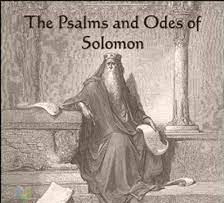The Psalms of Solomon is a collection of 18 psalms or hymns. Here is a list of the Psalms of Solomon:
- Psalm 1: Describes the blessedness of those who follow the Law and the misery of the ungodly.
- Psalm 2: Reflects on the futility of opposing God and the coming judgment on the unrighteous.
- Psalm 3: A psalm of penitence, seeking God’s mercy and forgiveness.
- Psalm 4: Describes the confidence of the righteous in God’s protection.
- Psalm 5: Prays for God’s guidance and protection against enemies.
- Psalm 6: A penitential psalm seeking God’s mercy and healing.
- Psalm 7: A prayer for deliverance from enemies and vindication.
- Psalm 8: Celebrates the glory and wisdom of God in creation.
- Psalm 9: A psalm of thanksgiving and praise for God’s righteous judgment.
- Psalm 10: Prays for God’s intervention against the wicked and the oppressors of the righteous.
- Psalm 11: Trust in God’s justice and refuge in times of trouble.
- Psalm 12: A prayer for God’s protection and deliverance from the wicked.
- Psalm 13: A plea for God’s mercy and the removal of affliction.
- Psalm 14: Reflects on the folly of the ungodly and the wisdom of those who fear God.
- Psalm 15: Describes the characteristics of those who may dwell in God’s holy presence.
- Psalm 16: A psalm of trust and confidence in God’s protection and guidance.
- Psalm 17: A prayer for deliverance from enemies and for God’s justice.
- Psalm 18: A hymn of praise celebrating God’s salvation and righteousness.
Contents
Historical Background of Psalms of Solomon
The historical background of the Psalms of Solomon sheds light on the political and religious climate of the intertestamental period, offering a glimpse into the aspirations and struggles of the Jewish community around 60 BC.
Despite being named after King Solomon, the collection of 18 war songs was actually composed much later, reflecting the earthly desires and worship practices of the Jewish people during that time. The Psalms of Solomon provide valuable insights into the cultural context of the intertestamental period, illustrating the hopes for freedom and liberation harbored by the community.
During this period, the Jewish people faced political turmoil and religious challenges, seeking solace and guidance through their worship practices.
The Psalms of Solomon, although not considered inspired Scripture, offer a unique perspective on the beliefs and Messianic expectations of the Jewish community.
Themes and Symbolism in Psalms
Exploring the Psalms of Solomon reveals a rich tapestry of themes and symbolism that delve into concepts of righteousness, divine judgment, and the eternal destiny of Jerusalem.
- Divine Justice: The Psalms of Solomon emphasize the importance of divine justice, showcasing how God rewards the righteous and punishes the wicked according to their deeds. This theme underscores the belief in a just and fair God who oversees the affairs of humanity.
- Eternal Covenant: Within the Psalms, there’s a recurring theme of the eternal covenant between God and His people. This covenant signifies a lasting agreement between God and Israel, highlighting the enduring relationship and promises made by the divine.
- Worship Songs: The Psalms of Solomon can be seen as a collection of worship songs that exalt the Lord, express devotion, and seek deliverance. These songs serve as a means of connecting with the divine, offering praise, and seeking guidance in times of need.
In these psalms, the intricate interplay of divine justice, the eternal covenant, and the act of worship serves to illuminate the theological depth and significance of the Psalms of Solomon.
Influence of Psalms of Solomon
Delving into the intricate layers of history and theology, the influence of Psalms of Solomon resonates deeply within the realms of early Christian literature and beliefs. These Psalms, considered inspired Scripture by many, hold a pivotal place in the discussions surrounding First Century Jewish and early Christian thought.
They offer a window into the Messianic expectations of the time, shaping the understanding of the anticipated deliverer within the Jewish community. The Psalms of Solomon not only provide insights into the theological landscape but also shed light on historical events and perspectives prevalent in ancient Semitic culture.
Psalms that touch upon themes of theology, history, and ancient Semitic culture, here are a few examples:
- Psalm 78: This psalm provides a historical overview of God’s interactions with the people of Israel, recounting events from the Exodus to the establishment of David as king.
- Psalm 105: Similar to Psalm 78, this psalm rehearses the history of God’s covenant with Israel, highlighting key events and the faithfulness of God.
- Psalm 106: This psalm acknowledges both the sins and the faithfulness of God throughout Israel’s history, emphasizing the importance of repentance and God’s mercy.
Through their influence on early Christian literature, the Psalms of Solomon played a crucial role in shaping the narrative surrounding the Messiah and the expectations attached to this figure.
The rediscovery of these texts after centuries of being lost has granted scholars a unique opportunity to delve into the complexities of the Pharisees and Sadducees conflict, offering a deeper understanding of the tensions within Jewish society during that era.
The Psalms of Solomon contribute significantly to the rich tapestry of ancient religious texts, providing a valuable resource for studying the interplay between religious beliefs and cultural practices in the First Century.
Significance for Modern Readers
Unveiling the enduring relevance of the Psalms of Solomon for modern readers requires a deep dive into their profound insights into ancient religious beliefs and practices. These ancient texts offer a unique perspective on historical events and provide a firsthand viewpoint from eyewitnesses of the time.
The significance of the Psalms of Solomon for modern readers lies in:
- Understanding Ancient Religious Beliefs: The Psalms shed light on the religious beliefs and practices of ancient times, offering valuable insights into the spiritual mindset of the period.
- Exploring Historical Events: Through a poetic lens, the Psalms provide a lens into historical events, allowing readers to grasp the emotions and perspectives of those who lived through these moments.
- Preserving Ancient Semitic Culture: By rediscovering and studying the Psalms of Solomon, modern readers gain a deeper understanding of the ancient Semitic culture, its traditions, and its impact on the broader historical narrative.
Interpretation and Theology of Psalms
The Psalms of Solomon offer a profound insight into ancient Jewish expectations of the Messiah and their theological implications for understanding Messianic roles. This collection of eighteen psalms, likely used in worship, reflects the anticipation of a powerful figure, often referred to as the Son of David or King Solomon, who’d bring about earthly victory, liberation from oppression, and establish justice.
The text emphasizes the Messiah’s role in delivering the people from their enemies and setting up a righteous rule on earth. While these expectations align with a militaristic and triumphant figure, Jesus’ interpretation of his Messianic role diverged by focusing on spiritual liberation and salvation.
Here are examples of Psalms of Solomon that align with the militaristic and triumphant expectations you mentioned:
- Psalm of Solomon 17: This psalm speaks of the Messiah as a warrior who will judge the ungodly nations, destroy sinners, and establish a kingdom of righteousness.
- Psalm of Solomon 18: Describes the Messiah as a powerful king who will destroy the wicked nations, purify Jerusalem, and rule with justice.
- Psalm of Solomon 2: Reflects Messianic expectations, including the idea of a conquering king who will bring victory over enemies and establish a reign of righteousness.
The discrepancy between the expected and actual roles of the Messiah is highlighted through the lens of the Psalms of Solomon, prompting theological discussions about the nature of deliverance, justice, and the kingdom of God.
These ancient texts provide valuable insights into the diverse interpretations of Messianic prophecies and the evolving theological landscape of the time.
Conclusion
As you reflect on the Psalms of Solomon, you can see the rich historical context and deep theological themes woven throughout the text. These ancient war songs provide a unique perspective on the beliefs and practices of the time, offering valuable insights into the culture of the 1st Century B.C.
Through the lens of poetry, the Psalms of Solomon continue to resonate with modern readers, inviting us to explore the interpretation and theology embedded within these powerful verses.


0 Comments